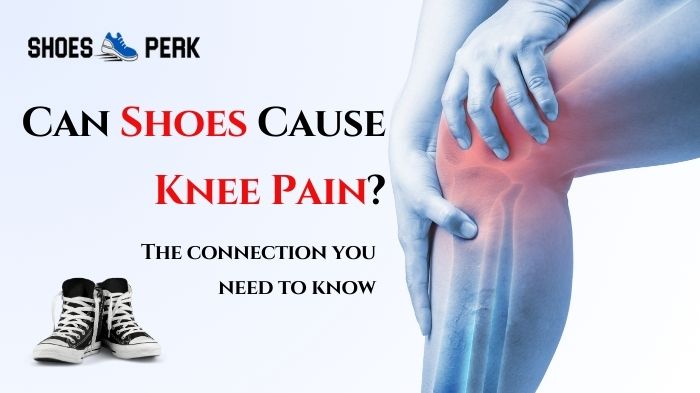Joint pain is a common problem for many people, especially when they become old. Although many factors play a role in developing knee, ankle, and foot pain, one easily modifiable type is the shoes we wear.
It might sound surprising when we think about whether shoes can cause knee pain. But yes, improper footwear can absolutely contribute to knee pain.
In this post, you will read about how a shoe impacts your knee and which shoes are good or bad for your knees.

How Shoes Impact Your Knees?
Whether standing still, waking, running, or playing, the wrong shoe always affects your knees, hips, and back.
Your point on whether shoes can cause knee pain is absolutely true. However, some factors directly affect your knees.
1- Alignment
When you wear shoes that directly affect your body’s natural alignment, they will ultimately cause knee pain and affect your walk.
If you wear high heels, they shift your weight forward and pull your kneecap out of alignment. This consistent pressure can lead to pain and even contribute to osteoarthritis.
Similarly, a worn-out sneaker can increase stress on your knee joints. Over time, sneaker soles lose their structure and affect your walk and body structure.
2- Support
Shoes that are too tight or too loose and don’t properly support your foot’s arches can impact your knees.
This lack of support disrupts your natural shock absorption, leads to imbalances in your walk, and puts pressure on your knees.
3- Cushioning
When we buy a pair of shoes, we always check its cushioning feature. But every shoe expires and needs to be replaced to keep your body muscles healthy.
When you wear worn-out soles or shoes with minimal cushioning, they fail to absorb shock, sending it directly to your legs and impacting your knees.
4- Motion Control
If you have specific foot mechanics like overpronation (inward rolling), shoes without adequate control can strain your knee ligaments.
A shoe is not only a design, but it’s a part of your body language, the way you walk. The way you’re going to move is quite dictated by your shoes.
Christian Louboutin
Are you facing hip, ankle pain due to shoe or Ingrown Toenails issues then read are posts.
Which Type of Shoes Causes Knee Pain?
If you understand that one almost always wears shoes while lifting weights, it can be easy to see how a shoe changes your natural walking and standing structure. Thus, choosing the right shoe for everyday wear is important. However, this can be challenging to do.
Some shoes that damage your biomechanics are high heels, sandals, boots, and flats. Here are some reasons why these shoes can cause knee and lower limb pain.
High Heels:
Starting with high-heeled shoes, shoes with an extra heel height of two inches or more transfer the weight normally distributed more evenly across one’s foot to the forefoot. People who wear heels are at risk of sprained ankles because the base of the heel is too narrow.

Sandals:
Now let’s talk about the following type of footwear: sandals. These shoes, in general, are not made with much cushioning, have less stability/support due to their open nature, and sometimes have no back.
A lack of support can cause your toes to grip the shoe as you walk (eventually leading to a bunion or general stress in the foot). If looking for sandals, try to find ones with lots of straps for support; at least some cushioning and arch support are always helpful.
Flats:
Now, about flat shoes, Flats can be a good option if they don’t sacrifice cushioning, natural toe box, and arch support.
Unfortunately, many shoes have bent tapers at the end, which can force the toes into a tight spot that prevents them from properly extending the force of one’s body (pointed toes).One of the main selling points of these types of shoes is their flexibility. The ability to bend or fold a shoe in half does not benefit one’s foot mechanics.
Boots:
Shoes have some advantages and some disadvantages. The stretchy and cushioned nature of the shoe means they help stabilize the ankle joint and protect against sprain injuries.
However, they often have high heels that can pressure the front of the foot. If they are too high, problems can also arise.
Which Shoes Are Good for Knee Pain?
Now that you understand how poor shoe design can compromise foot mechanics, what are the things to look for in a good shoe? The key is finding a stable, supportive shoe over a flat, flexible one.
Some studies show that regular activity in a stable and supportive shoe reduces pain in more people than in flat and flexible shoes. This is true for some people, especially those with medial knee osteoarthritis and varus malalignment. This is why wearing such shoes reduces the medial tibiofemoral contact force.
The summary is to wear shoes that provide stability and support through cushioning, arch support, and a wide contact surface for that all-important stability. Many people wear athletic shoes to find the support their feet need.
Bottom Lines
While there is an advantage to wearing supportive shoes, having the right shoes will not always prevent pain from worsening, nor will they relieve all associated knee pain on their own if you are already experiencing pain. So choose wisely and don’t compromise your health. Shoes affect your health a lot.
